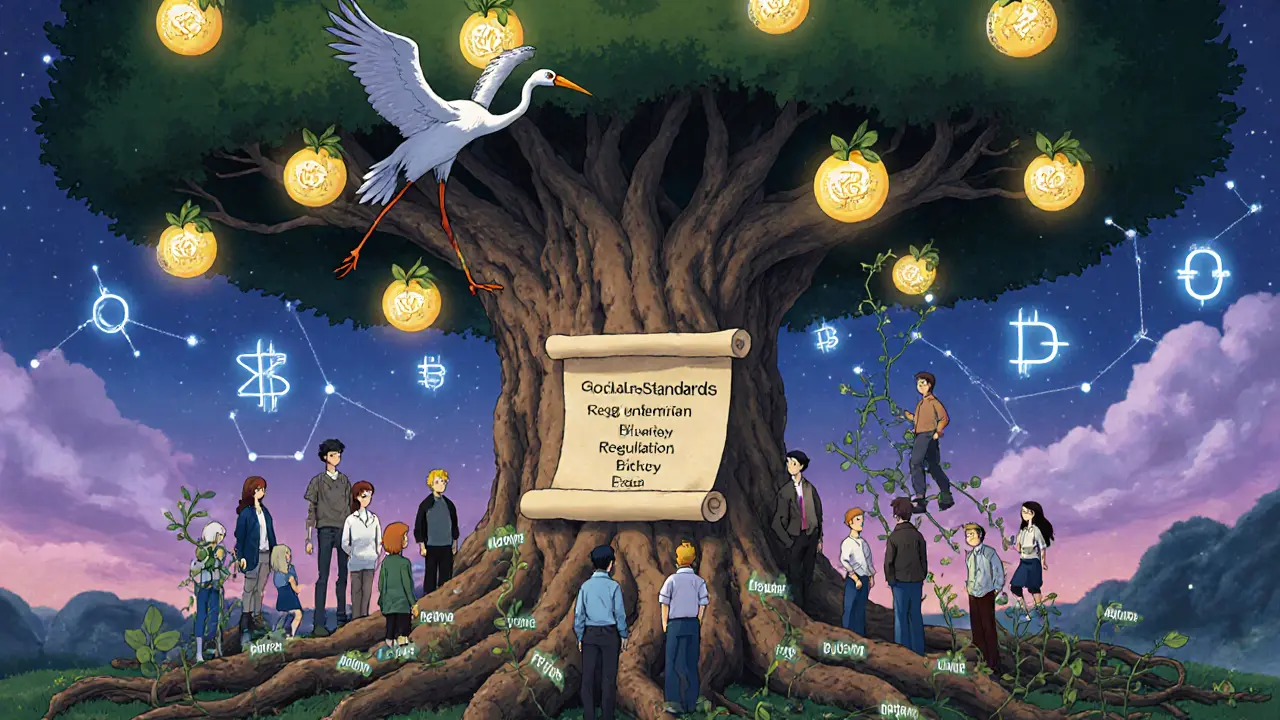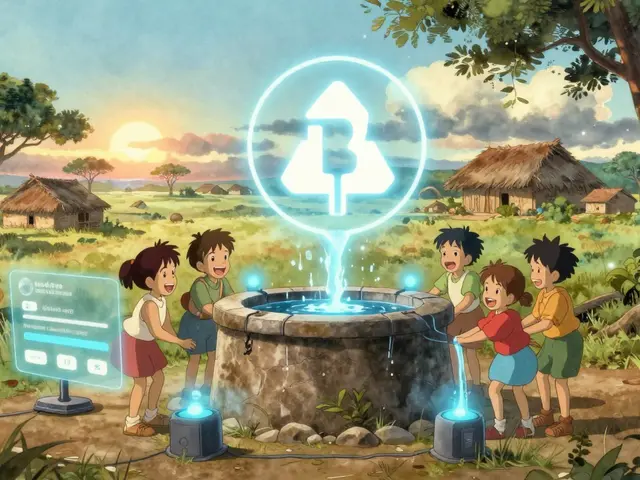Real Estate NFT Regulatory Checker
Regulatory Status
Jurisdiction:
Imagine buying a house in 72 hours - no agents, no paperwork, no waiting for bank approvals. Just a digital deed on the blockchain, signed with a crypto wallet, and done. Sounds like the future? It’s already happening in places like Wyoming and Georgia. But for every success story, there are ten more projects stuck in legal limbo. Real estate NFTs promise faster, cheaper, and more transparent property deals. Yet, they’re being held back not by technology, but by regulation.
What Are Real Estate NFTs, Really?
Real estate NFTs are digital tokens that represent ownership of physical or virtual property. Unlike cryptocurrencies like Bitcoin, each NFT is unique - one token might stand for a whole apartment in Lisbon, or 10% of a warehouse in Chicago. These tokens live on blockchains like Ethereum, Polygon, or Solana, and come with smart contracts that can automatically handle rent payments, maintenance fees, or even resale rules. The idea isn’t just theoretical. Platforms like Propy and RealT have completed thousands of tokenized property sales since 2019. In 2024, a 120-square-meter apartment in Dubai was sold as an NFT for $320,000 - fully documented on-chain, with no notary in sight. But here’s the catch: while the tech works, the law doesn’t always know what to do with it.The Legal Patchwork: No Global Rules, Just Confusion
There’s no such thing as a global rulebook for real estate NFTs. Every country treats them differently - and often inconsistently. In Switzerland, tokenized real estate is treated like securities under FINMA guidelines. In Singapore, regulators allow it under strict licensing. Georgia has had a blockchain land registry since 2016 and processed over a million transactions with zero fraud. Meanwhile, in the U.S., the SEC has already shut down at least two platforms - including TokenHomes in March 2025 - for selling unregistered securities. The same NFT deed that’s legal in Wyoming might be illegal in California. The European Union’s MiCA regulation, which took effect in December 2024, was supposed to bring clarity. But it doesn’t specifically mention real estate NFTs. That left 45% of NFT projects unsure if they’re classified as investment products, utility tokens, or something else entirely. Even worse, 15 different EU countries interpret MiCA differently. A property token sold in Germany might need different disclosures than one sold in Italy.Why This Matters: Liquidity, Fraud, and Lost Money
Regulatory uncertainty doesn’t just slow things down - it kills markets. Take liquidity. Real estate NFTs are hard to sell because buyers don’t trust them. Why? Because they don’t know if the token they’re buying will be recognized next year. Secondary market trading volume for these tokens is only 12% of primary sales. Bid-ask spreads - the gap between what someone’s willing to pay and what a seller wants - average 15-20%. That means if you buy a $100,000 fractional NFT stake in a Miami condo, you might only get $80,000 if you try to sell it tomorrow. And it’s not just slow sales. Fraud is rampant. In 2023, NFT marketplaces saw 37 major security breaches, 68% of them due to smart contract bugs. One European investor lost $120,000 in 2024 when trying to transfer a property NFT between two countries with conflicting laws. The token was valid in one jurisdiction - but the other didn’t recognize blockchain titles at all. No court, no recourse. On Trustpilot, real estate NFT platforms average just 3.2 out of 5 stars. Two-thirds of negative reviews mention regulatory confusion as the top reason they’re frustrated. People aren’t mad at the tech. They’re mad that no one told them it might be illegal.
Who’s Winning? Who’s Losing?
The winners are clear: jurisdictions with clear rules. Sweden’s Lantmäteriet land registry has been using blockchain since 2016. Their system is so clean, users rate it 4.7 out of 5 for clarity. Georgia’s system handles over 1.2 million transactions with zero fraud. Even JPMorgan is testing its own blockchain platform, Onyx, for commercial real estate deals. The losers? Small platforms and everyday investors. Startups trying to launch real estate NFT marketplaces now face KYC/AML compliance costs that rose 20-35% in 2025. Many can’t afford the legal teams needed to navigate 15 different regulatory regimes. As a result, 30% of new NFT real estate projects have delayed their launch - or scrapped them entirely. Meanwhile, traditional real estate professionals are stuck. A 2025 survey found that 40-60 hours of training are needed just to understand how to handle an NFT property deal. Most agents still don’t know how to verify a blockchain deed, let alone explain it to a client.What’s Being Done to Fix This?
Change is coming - slowly. The European Central Bank launched a pilot in April 2025 to test cross-border real estate NFT transactions across 12 Eurozone countries. The goal? Harmonize how MiCA is applied. In the U.S., the SEC is expected to release its first official framework for classifying real estate tokens by Q4 2025. That could finally answer the question: Is this a security? A commodity? Or just a digital deed? New companies like TitleToken and BlockTitle are building blockchain-native escrow and title insurance services. They’ve raised $185 million in Q1-Q2 2025 alone. Their pitch? Make it safe, legal, and simple. The Real Estate Blockchain Alliance, with over 5,200 members across 47 countries, is pushing for global standards. They want one set of rules for verifying ownership, one format for digital deeds, and one way to resolve disputes. But until then, it’s a wild west.
What Should You Do If You’re Considering Real Estate NFTs?
If you’re an investor:- Only buy in jurisdictions with clear laws - Switzerland, Singapore, Georgia, Sweden, or Wyoming.
- Never invest more than you can afford to lose. Liquidity is low, and legal risks are high.
- Use multi-signature wallets. 68% of institutional platforms use them to prevent single-point failures.
- Learn the basics of blockchain deeds and smart contracts. There are free courses from the Real Estate Blockchain Alliance.
- Know your local laws. In some U.S. states, blockchain titles are legally binding. In others, they’re not.
- Don’t promise clients it’s “the future.” Tell them it’s a risky, unregulated experiment - and only for the brave.
- Don’t build for the whole world. Build for one country first. Get it right there before expanding.
- Partner with local legal firms. Don’t assume your smart contract is enough.
- Use Polygon or Solana, not Ethereum. Gas fees on Ethereum can be $12 per transaction. On Polygon? Less than 15 cents.







Leo Lanham
November 7, 2025 AT 01:34 AMThis whole thing is just crypto bros trying to skip the boring parts of buying a house. You don't need a blockchain to sell a condo. You need a lawyer who doesn't charge $500 an hour. I'm not mad, I'm just disappointed.
Colin Byrne
November 8, 2025 AT 03:57 AMLet’s be clear: this isn’t about regulation-it’s about control. The state has spent centuries building systems to extract value from property transactions through fees, notaries, and bureaucratic inertia. Blockchain threatens that entire rent-seeking architecture. The legal gray zone isn’t an accident; it’s a deliberate chokehold by institutions that fear obsolescence. We’ve seen this with music, banking, and now real estate. The tech is always ahead. The law always lags. And the people who suffer? The ones trying to get out of the system, not into it.
Wyoming’s success isn’t luck-it’s rebellion. Georgia’s zero-fraud record? That’s what happens when you cut out the middlemen who profit from confusion. The SEC shutting down TokenHomes isn’t protecting investors-it’s protecting legacy title companies worth billions. And yet, the same regulators who call these tokens ‘securities’ still allow REITs with 10x the opacity. Hypocrisy isn’t a bug-it’s the business model.
Meanwhile, everyday people are told to ‘invest only in jurisdictions with clear laws’ as if they have the resources to navigate 47 legal systems. That’s not advice-it’s exclusion. The real innovation isn’t the NFT. It’s the idea that property ownership shouldn’t require a law degree to access. If we’re going to call this a ‘wild west,’ then stop acting like the sheriffs have any moral authority. They’re just holding the gates shut so their golden handcuffs don’t rust.
And yes, liquidity is low. Of course it is. When you’re trading something the government might declare illegal next Tuesday, no one’s going to bid high. But that’s not a flaw in the tech-it’s a flaw in the system. We don’t blame the horse for not running faster when the road is made of molasses.
Stop calling it ‘risky.’ Call it ‘resistant to corruption.’ Stop calling it ‘unregulated.’ Call it ‘disrupting rent extraction.’ The language we use is the first step in legitimizing the revolution. And if you’re still waiting for permission to innovate, you’re already too late.
Brian Webb
November 8, 2025 AT 23:02 PMI get the frustration, but I’ve seen too many people lose money thinking blockchain = instant legal protection. My cousin bought a fractional NFT in Lisbon last year. Thought he was set. Turned out Portugal doesn’t recognize blockchain titles for residency purposes. He’s still stuck in legal limbo, paying property taxes twice. The tech is cool, but the human side? Still messy.
Maybe we need to stop thinking of this as ‘the future’ and start treating it like a beta test. Use it for small stuff first. A garage. A storage unit. Something you can afford to lose. Build trust slowly.
Whitney Fleras
November 10, 2025 AT 06:34 AMThank you for writing this. I’m a real estate agent in Toronto and I’ve been trying to explain this to clients for months. Most think it’s either magic or a scam. The truth is somewhere in between. I’ve taken the free course from the Real Estate Blockchain Alliance-it’s actually really well done. I still don’t recommend it for first-time buyers, but I’m learning how to spot the legit platforms. Small steps.
Chris Hollis
November 11, 2025 AT 22:19 PMRegulatory uncertainty kills liquidity. That's it. No more analysis needed.
Diana Smarandache
November 12, 2025 AT 17:56 PMLet me be blunt: this isn’t innovation. It’s legal arbitrage disguised as progress. The fact that 30% of startups have scrapped their projects because they can’t afford compliance teams proves one thing-this isn’t for the people. It’s for venture capitalists who want to exit before regulators catch up. The ‘wild west’ metaphor is wrong. This isn’t the frontier. It’s a casino where the house always wins because the house writes the rules.
And don’t get me started on ‘blockchain-native escrow services.’ That’s like selling a fire extinguisher while the building is still under construction. You don’t fix a broken system by adding more layers of tech. You fix it by fixing the system.
Allison Doumith
November 12, 2025 AT 18:09 PMI used to believe in blockchain as liberation. Now I see it as just another tool for the rich to hide from accountability. You talk about Georgia’s zero fraud record-great. But how many of those transactions involved people who actually live there? Or were they just shell companies using fake identities to park money? The blockchain doesn’t lie-but the people behind it do. And no amount of smart contracts can fix that. The real problem isn’t regulation-it’s trust. And trust can’t be coded. It’s built over decades, through institutions, through accountability, through consequences. What we’re seeing here isn’t the future. It’s the past repeating itself-just with more crypto jargon.
I’ve watched this movie before. Remember the dot-com boom? Everyone thought websites were magic. Then the crash came. And the ones who survived? They weren’t the ones with the flashiest tech. They were the ones who understood human behavior. Real estate isn’t about tokens. It’s about people. And people need more than a private key to feel safe.
So when you tell me ‘just buy in Wyoming’-I hear ‘just become someone else’s gamble.’ And I’m done being someone’s gamble.
Scot Henry
November 13, 2025 AT 00:59 AMMan I just tried to buy a piece of a house in Miami via NFT last month. Thought it was easy. Took me 3 weeks just to figure out if my wallet was even allowed to hold it. Ended up giving up. Honestly? I think the whole thing’s gonna die unless someone makes it stupid simple. Like, Uber simple. Right now it’s like trying to use a drone to deliver a sandwich in a hurricane.
Also, Polygon gas fees are a joke. 15 cents? That’s like saying a Tesla is affordable if you ignore the $80k price tag.
Sunidhi Arakere
November 13, 2025 AT 15:08 PMInteresting read. In India, property records are still handwritten in some villages. Blockchain might seem too advanced, but the idea of transparency is universal. Maybe the real lesson here is not about NFTs-but about how every society needs a fair, clear system to prove ownership. Technology can help. But only if it serves people, not the other way around.